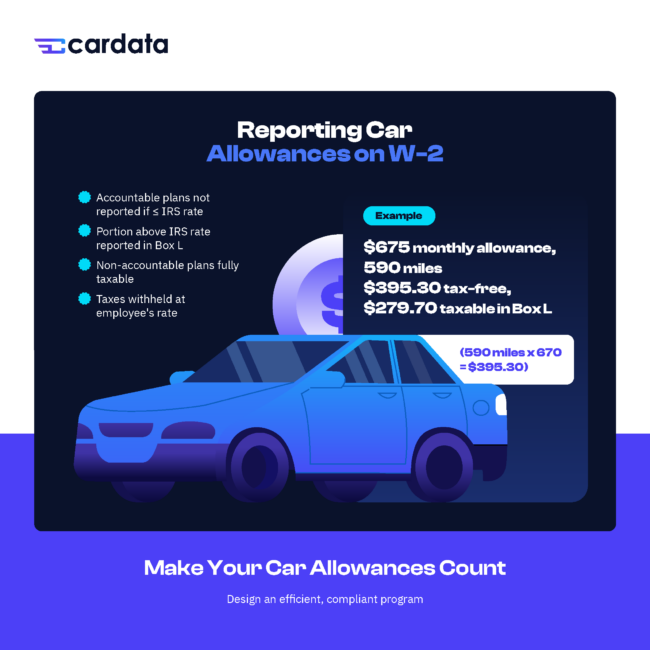Follow us on LinkedIn
Our PageIntroduction
This article’s perspective is valuable if you manage any number of employees and are specifically responsible for monitoring their mileage logs or administering repayments for car expenses.
We will discuss key IRS terms such as fringe benefits, accountable benefit plans, and what constitutes a legitimate business expense in the eyes of the IRS. We’ll also unpack what the IRS requires for documentation and what constitutes “adequate and timely records” according to crucial pieces of IRS literature.
Understanding the theory behind the different forms of vehicle reimbursement programs the IRS offers allows you to evaluate the benefits and drawbacks of varying car allowance methods.
Keep reading to learn more about the different structures your business can choose to reimburse employees with, how the IRS views each of them, and whether or not they have any advantages over other ways of compensating employees.
The Purpose Of Car Allowances In The Corporate World
Car allowances became a popular benefit in American society in the 20th century when businesses realized that maintaining and operating fleets of company cars wasn’t always a cost-effective decision. In the search for savings to pass onto shareholders, it became common practice to have employees use their personal vehicles for work rather than a company car — with the caveat that all business-related driving would be promptly reimbursed.
Often, any monetary compensation provided to cover employee driving costs is identified using the generic term “car allowance.”
The purpose of car allowances is to accrue savings for your business through lower risk profiles and vehicle costs than those experienced by businesses operating a fleet. Your employees get the flexibility and satisfaction of driving their vehicle for work while being covered for the costs. And if certain conditions are met, the car allowance is tax-free, saving you and your employees money.
IRS Regulations And Definitions
Our summary of the IRS’ views on car allowances primarily comes from IRS Publication 463, cited above. [1]
The IRS provides precise definitions for a few standard terms in this document, which we’ll refer to below. The relevant definitions are as follows:
Accountable plans. A benefit plan, which includes car allowance payments, is considered “accountable” to the IRS if it satisfies three rules about the legitimacy of the business expense, whether the employer was notified “within a reasonable amount of time,” and whether any excess payments are returned.
Adequate accounting. The IRS states that an employee provides “adequate accounting by giving [their] employer a statement of expense, an account book, a diary, or a similar record in which [the employee] entered each expense at or near the time [they] had it, along with documentary evidence (such as receipts) of [their] travel, mileage, and other employee business expenses.”
The standard mileage rate. This is a value the IRS sets once or twice annually. It’s meant to cover all driving costs for business, such as maintenance fees, insurance and title payments, depreciation, and fuel costs. Important note: taxpayers cannot claim the standard mileage rate if they use “five or more cars at the same time (such as in fleet operations).”

What is business use of a vehicle versus personal use?
The IRS’ view on the matter is that the “qualified business use of a vehicle” is defined as “any use in your trade or business, except for the use for the production of investment income.”
This definition is deliberately vague to apply to the broadest possible spectra of workplaces and trades. A professional clown and a welder may both need to use their vehicles for work, but the activities they require those vehicles for will be very different.
What is expected by the IRS is that you (or your employees) document, document, document, no matter what the business expense is.
Read more: HR leaders: Differentiating Personal and Business Use

What Is The Employer’s Role In Verifying Business Expenses?
Whether you are an independent contractor or a fleet manager, keeping your business compliant with IRS requirements is critical.
The IRS stipulates that employers must ensure that logs of business expenses kept by employees are updated on a timely basis, at least every 30 days.
The employer must make every effort in good faith to verify that the logs document a qualified business use of the vehicle and to match any details in the record to supplementary evidence provided, such as receipts.
This process can be simplified by using mileage-tracking apps for larger workforces. These apps often provide a log function to record all necessary mileage data.
Penalties For Non-Compliance
Employers who do not oversee employee business expense claims do not provide the Internal Revenue Service with documentary evidence when requested, or demonstrate no effort to correct and recoup overpayment to employees are at risk of losing their accountable status for their benefit plan.
This means the car allowance payments are now subject to state and federal payroll and income taxes and must be withheld and reported by the employer. This applies retroactively if payments for business use of employee vehicles were made in the current fiscal year.
The IRS may conduct an audit if the business consistently disregards the IRS car allowance rules and regulations. Staying in good standing with the Internal Revenue Service should be a cornerstone of any responsible corporate governance strategy. [2]
Conclusion: Strategies For Tax-Efficient Car Allowance Programs
One strategy many businesses employ to ensure that their car allowance programs comply with IRS regulations is consulting with an accounting firm or tax strategist with experience in the field.
From the perspective of the IRS, ignorance of the rules and regulations around car allowances is no excuse for noncompliance, so consulting a tax professional knowledgeable in the subject ensures your business doesn’t overlook any essential requirements.
Others choose to automate certain aspects of the process. Mileage-tracking apps match geolocational data with employee logs, reducing the administrative headache they can represent. Cardata is confident our expertise can help your business simplify oversight and management of its car allowance program.
Sources
[1] Publication 463 | Internal Revenue Service
[2] Top IRS Audit Triggers | Bloomberg Tax
Disclaimer: Nothing in this blog post is legal, accounting, or insurance advice. Consult your lawyer, accountant, or insurance agent, and do not rely on the information contained herein for any business or personal financial or legal decision-making. While we strive to be as reliable as possible, we are neither lawyers, accountants, or agents. For several citations of IRS publications on which we base our blog content ideas, please always consult this article: https://www.cardata.co/blog/irs-rules-for-mileage-reimbursements. For Cardata’s terms of service, go here: https://www.cardata.co/terms.
Share on:



